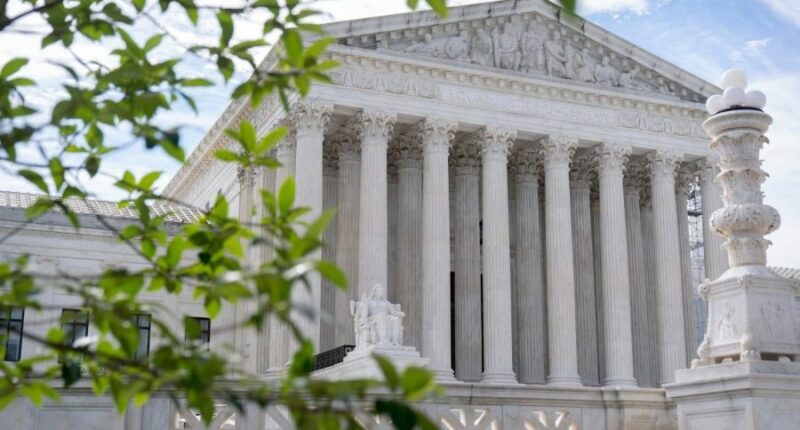Share this @internewscast.com

On Thursday, the Supreme Court upheld the Trump administration’s policy allowing the State Department to prevent transgender individuals from listing their gender identity on passports, at least temporarily.
This decision marks another legal win for President Trump, aligning with his administration’s broader aim to dismantle policies surrounding what it terms as “gender ideology.” The Justice Department pursued this emergency appeal following lower court decisions that had blocked the passport policy, criticizing it as being based on “irrational prejudice.”
The court’s majority opinion, which was not signed, stated that indicating a passport holder’s sex at birth is no more a violation of equal protection than noting their country of birth. According to the ruling, both are simply acknowledgments of historical facts without imparting unequal treatment.
The decision appeared to follow the court’s usual 6-3 conservative-liberal split, although the justices are not required to publicly reveal how they voted.
In a dissenting opinion, the court’s liberal justices criticized the ruling as a “pointless but painful perversion.”
Justice Ketanji Brown Jackson, with Justices Elena Kagan and Sonia Sotomayor in agreement, lamented what she described as the court’s “senseless sidestepping of the obvious equitable outcome,” noting that this has become an unfortunate trend.
“So, too, has my own refusal to look the other way when basic principles are selectively discarded,” the dissent continued.
Solicitor General D. John Sauer called lower rulings blocking the administration’s policy “untenable,” casting them as infringing on Trump’s constitutional authority over foreign affairs.
“The President’s choice to revert to prior policy and rely on biological sex—a choice that bound the State Department—should be the last place for novel equal-protection claims or Administrative Procedure Act objections,” Sauer wrote in court filings.
The State Department policy requires passport holders to use their sex assigned at birth as their sex designation, prohibiting transgender people from matching it with their gender identity. The policy also removed the option for people to select “X,” leaving male and female as the only two options.
“This new policy puts transgender, nonbinary, and intersex people in potential danger whenever they use a passport,” American Civil Liberties Union (ACLU) attorney Chase Strangio warned in court filings.
Strangio and the ACLU represent transgender and nonbinary Americans who are suing over the State Department’s changes.
They argue it violates federal law and constitutional equal protection rights, convincing a federal district judge appointed by former President Biden and later the 1st U.S. Circuit Court of Appeals to halt the policy.
It marked the latest case implicating Trump’s Day 1 executive order that cracks down on what he calls “gender ideology” to reach the Supreme Court. Previously, the justices issued emergency orders allowing the administration to enforce its transgender troops ban and cancel diversity-linked health grants.










